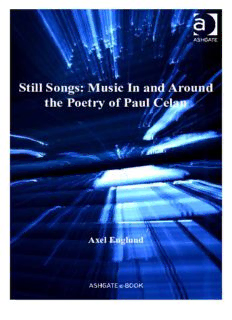
Still Songs: Music In and Around the Poetry of Paul Celan PDF
Preview Still Songs: Music In and Around the Poetry of Paul Celan
Still Songs: Music In and Around the Poetry of Paul Celan Axel Englund Still SongS: MuSic in and around the Poetry of Paul celan I am never merry when I hear sweet music. (Jessica in The Merchant of Venice, act V, Scene i) Still Songs: Music in and around the Poetry of Paul celan axel englund Stockholm University, Sweden © axel englund 2012 all rights reserved. no part of this publication may be reproduced, stored in a retrieval system or transmitted in any form or by any means, electronic, mechanical, photocopying, recording or otherwise without the prior permission of the publisher. axel englund has asserted his right under the copyright, designs and Patents act, 1988, to be identified as the author of this work. Published by ashgate Publishing limited ashgate Publishing company Wey court east Suite 420 union road 101 cherry Street farnham Burlington Surrey, gu9 7Pt Vt 05401-4405 england uSa www.ashgate.com British Library Cataloguing in Publication Data englund, axel. Still songs : music in and around the poetry of Paul celan. 1. celan, Paul--criticism and interpretation. 2. celan, Paul--Musical settings--history and criticism. 3. Music and literature--germany--history--20th century. 4. german poetry--20th century--history and criticism. i. title 780'.0831-dc23 Library of Congress Cataloging-in-Publication Data englund, axel. Still songs : music in and around the poetry of Paul celan / axel englund. p. cm. includes bibliographical references and index. iSBn 978-1-4094-2262-4 (hardcover) -- iSBn 978-1-4094-2263-1 (ebook) 1. Music--germany--20th century--history and criticism. 2. celan, Paul--Musical settings--history and criticism. 3. national socialism and literature. i. title. Ml275.5.e55 2012 831’.914--dc23 2011036586 iSBn 9781409422624 (hbk) iSBn 9781409422631 (ebk) Bach musicological font developed by © yo tomita. III Printed and bound in great Britain by the MPg Books group, uK. Contents Note on Editions and Translations vii List of Music Examples and Figures ix Acknowledgements xi Introduction: Poetry and Music in Conflict and Convergence 1 1 Play Death Sweeter: Musicality, Metaphoricity, Murder 21 2 Fire in the Harp, in her Hair: The Lied and the Lullaby 55 3 Rises and Plays: Interruptive Repetition and the Law of Musical Purity 87 4 Into You, Into You I Sing: Spasmodic Speech and the Borders of the Human Body 123 5 We Resound: Music In and Beyond the First Person Plural 155 6 Shattered the Songs: Dissonances of a German-Jewish Musicality 189 Bibliography 225 Index 237 This page has been left blank intentionally Note on Editions and Translations Paul Celan’s texts are quoted from the following editions (all translations are by the author unless otherwise noted): Gesammelte Werke, ed. Beda Allemann and Stefan Reichert (7 vols, Frankfurt am Main, 2000), henceforth abbreviated as I–VII. Die Gedichte: Kommentierte Gesamtausgabe, ed. Barbara Wiedemann (Frankfurt am Main, 2003), henceforth abbreviated as KG. Mikrolithen sinds, Steinchen: Die Prosa aus dem Nachlaß, ed. Barbara Wiedemann and Bertrand Badiou (Frankfurt am Main, 2005), henceforth abbreviated as PN. This page has been left blank intentionally List of Music Examples and Figures Music Examples 1.1: Medek, Todesfuge, harmonic reduction of opening 42 1.2: Medek, Todesfuge, setting of ‘Schlangen’ passage 43 1.3: Medek, Todesfuge, setting of ‘da liegt man nicht eng’ 45 1.4a–b: Medek, Todesfuge, setting of ‘der Tod ist ein Meister’ 46 1.5: Medek, Todesfuge, soprano ending 47 1.6: Birtwistle, ‘Todesfuge – Frieze 4’, bars 1–5 49 1.7: Birtwistle, ‘Todesfuge – Frieze 4’, violin part of bars 63–5 51 1.8: Birtwistle, ‘Todesfuge – Frieze 4’, bars 88–93 53 2.1: Medek, ‘Sie kämmt ihr Haar’, bars 1–9 72 2.2: Karkoschka, ‘Sie (Wiegenlied)’, bars 1–5 74 3.1: Reimann, Engführung, opening of section IV 94 3.2: Reimann, Engführung, opening of section VIII 102 3.3: Birkenkötter, Sieben Stücke, ending of piece IV (reduction) 112 4.1: Kurtág, ‘Tübingen, Jänner’, bars 17–33 128 4.2: Dittrich, Streichtrio, section I, bars 1–4 134 4.3: Dittrich, Streichtrio, section VI, bars 126–9 135 4.4: Dittrich, Streichtrio, section VI, bars 152–4 135 4.5: Dittrich, Streichtrio, section XII, bar 270 136 5.1: Denhoff, ‘Es sind noch Lieder zu singen…’, bars 1–4 159 5.2: Denhoff, ‘Es sind noch Lieder zu singen…’, bars 83–5 160 5.3: Denhoff, ‘Es sind noch Lieder zu singen…’, bars 126–8 161 5.4a: Rihm, ‘Fadensonnen’, bars 1–4 164 5.4b: Birtwistle, ‘Fadensonnen’, bars 1–4 165 5.5a: Rihm, ‘Fadensonnen’, ending 166 5.5b: Birtwistle, ‘Fadensonnen’, ending 167 6.1: Ruzicka, …der die Gesänge zerschlug, III, martellato figure 204 6.2: Ruzicka, …der die Gesänge zerschlug, X, ‘Erstarrung’ passage 209 6.3: Ruzicka, …der die Gesänge zerschlug, XI, ‘statico’ passage 210 6.4: Ruzicka, …der die Gesänge zerschlug, XII, ‘Canto’, opening 211 Figures 4.1: Dittrich, Streichtrio, sections and durations 133 4.2: Dittrich, Singbarer Rest II, section III, excerpt from sung text 143
Description: